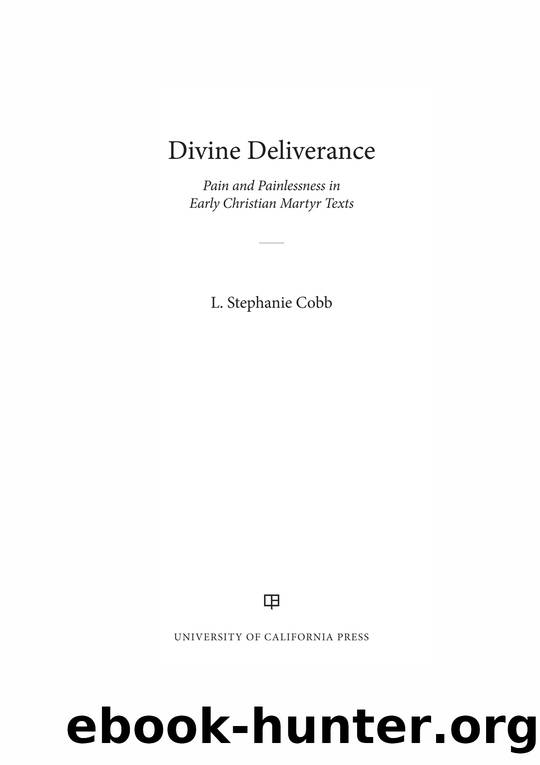Divine Deliverance: Pain and Painlessness in Early Christian Martyr Texts by L. Stephanie Cobb

Author:L. Stephanie Cobb [Cobb, L. Stephanie]
Language: eng
Format: epub
Tags: Religion, Ancient
ISBN: 9780520293359
Google: NaxGDQAAQBAJ
Publisher: Univ of California Press
Published: 2017-09-15T20:58:37+00:00
The body that has been exposed to icy cold first becomes all livid as the blood freezes. Then it shakes wildly and seethes, as the teeth chatter, the muscles spasm, and the whole mass contracts without purpose. A piercing pain [odunÄ de tis drimeia] and an unspeakable distress [ponos arrÄtos] touches the marrows and causes a freezing sensation that is hard to bear. . . . The heat is chased away from the extremities of the body and flees into the depths. On the one hand, it leaves dead the parts that it has deserted, and on the other hand, those parts into which it is compressed, it gives over to pain [odunais], as little by little death is present from freezing. (Hom. 19.5)88
Basil walks his audience through the biological responses to freezing temperatures; his detailed account of blood, teeth, and flesh draws listeners in as they empathize with the martyrs. Who hasnât experienced that strange sensation of bitter coldness that burns hot? Our teeth, too, chatter in winter and we shiver in the cold. The description engages the audienceâs imagination by invoking familiar life experiences. Pain is not incidental to this description; it is the shared experience of both martyrs and observers.
Pain is also central to the martyrsâ own descriptions of their experiences. Enduring the cold, they cry out: âthe winter cold is piercing, but paradise tastes sweet: freezing is painful [algeinÄ], but rest is pleasantâ (Hom. 19.6).89 The repeated emphasis on pain as the experience of the martyrsâin both the third-person observation of freezing to death as well as the first-person account of the martyrsâ experienceâsuggests that pain is particularly important to Basilâs understanding of the meaning of these deaths. Pain in martyrdom is endured in exchange for eternal reward: one pays in pain briefly on earth to redeem eternal joy. Pain as payment is demonstrated by the martyrsâ exhortations to each other: âlet the foot burn, so that it may dance continually with the angels; let the hand fall away, so that it may bring access to the Lordâ (19.6).90 The common endurance of excruciating pain demonstrates the solidarity and virtue of the Forty; it is also what makes them martyrs.
Prudentiusâs poems on martyrdom in Peristephanon contain varying assessments of martyrsâ pain. We have seen numerous occasions when he asserts the impassibility of Christian martyrs, but on other occasions the presence of pain is unclear. In recounting the martyrdom of Cyprian, for instance, he describes the Spirit descending on Carthage, empowering the Christians and teaching them âneither to be agitated nor yield nor be conquered by pain [dolore]â but âto resemble Christ and maintain faithâ (13.74â75). Are the martyrs not vanquished by pain because they do not feel it? Or do they feel the pain but are not overcome by it? In still other poems, however, pain is explicitly foregrounded. Prudentius, for example, laments the âpains [dolore] the tormentor inflictedâ on Emeterius and Chelidonius (1.81). The poet focuses on pain in the martyrdom of Cassian when he
Download
This site does not store any files on its server. We only index and link to content provided by other sites. Please contact the content providers to delete copyright contents if any and email us, we'll remove relevant links or contents immediately.
The Secret Power of Speaking God's Word by Joyce Meyer(3152)
Signature in the Cell: DNA and the Evidence for Intelligent Design by Stephen C. Meyer(3121)
Real Sex by Lauren F. Winner(3001)
The Holy Spirit by Billy Graham(2938)
The Gnostic Gospels by Pagels Elaine(2515)
Jesus by Paul Johnson(2348)
Devil, The by Almond Philip C(2322)
23:27 by H. L. Roberts(2241)
The Nativity by Geza Vermes(2220)
Chosen by God by R. C. Sproul(2155)
All Things New by John Eldredge(2149)
Angels of God: The Bible, the Church and the Heavenly Hosts by Mike Aquilina(1948)
The Return of the Gods by Erich von Daniken(1925)
Angels by Billy Graham(1915)
Knowing God by J.I. Packer(1844)
Jesus of Nazareth by Joseph Ratzinger(1797)
The Gnostic Gospel of St. Thomas by Tau Malachi(1779)
How To Be Born Again by Billy Graham(1775)
Evidence of the Afterlife by Jeffrey Long(1773)
